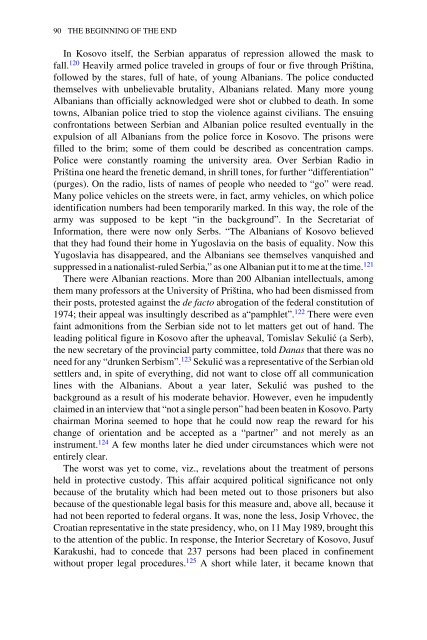Yugoslavia: A History of its Demise - Indymedia
Yugoslavia: A History of its Demise - Indymedia
Yugoslavia: A History of its Demise - Indymedia
Create successful ePaper yourself
Turn your PDF publications into a flip-book with our unique Google optimized e-Paper software.
90 THE BEGINNING OF THE END<br />
In Kosovo <strong>its</strong>elf, the Serbian apparatus <strong>of</strong> repression allowed the mask to<br />
fall. 120 Heavily armed police traveled in groups <strong>of</strong> four or five through Priština,<br />
followed by the stares, full <strong>of</strong> hate, <strong>of</strong> young Albanians. The police conducted<br />
themselves with unbelievable brutality, Albanians related. Many more young<br />
Albanians than <strong>of</strong>ficially acknowledged were shot or clubbed to death. In some<br />
towns, Albanian police tried to stop the violence against civilians. The ensuing<br />
confrontations between Serbian and Albanian police resulted eventually in the<br />
expulsion <strong>of</strong> all Albanians from the police force in Kosovo. The prisons were<br />
filled to the brim; some <strong>of</strong> them could be described as concentration camps.<br />
Police were constantly roaming the university area. Over Serbian Radio in<br />
Priština one heard the frenetic demand, in shrill tones, for further “differentiation”<br />
(purges). On the radio, lists <strong>of</strong> names <strong>of</strong> people who needed to “go” were read.<br />
Many police vehicles on the streets were, in fact, army vehicles, on which police<br />
identification numbers had been temporarily marked. In this way, the role <strong>of</strong> the<br />
army was supposed to be kept “in the background”. In the Secretariat <strong>of</strong><br />
Information, there were now only Serbs. “The Albanians <strong>of</strong> Kosovo believed<br />
that they had found their home in <strong>Yugoslavia</strong> on the basis <strong>of</strong> equality. Now this<br />
<strong>Yugoslavia</strong> has disappeared, and the Albanians see themselves vanquished and<br />
suppressed in a nationalist-ruled Serbia,” as one Albanian put it to me at the time. 121<br />
There were Albanian reactions. More than 200 Albanian intellectuals, among<br />
them many pr<strong>of</strong>essors at the University <strong>of</strong> Priština, who had been dismissed from<br />
their posts, protested against the de facto abrogation <strong>of</strong> the federal constitution <strong>of</strong><br />
1974; their appeal was insultingly described as a“pamphlet”. 122 There were even<br />
faint admonitions from the Serbian side not to let matters get out <strong>of</strong> hand. The<br />
leading political figure in Kosovo after the upheaval, Tomislav Sekulić (a Serb),<br />
the new secretary <strong>of</strong> the provincial party committee, told Danas that there was no<br />
need for any “drunken Serbism”. 123 Sekulić was a representative <strong>of</strong> the Serbian old<br />
settlers and, in spite <strong>of</strong> everything, did not want to close <strong>of</strong>f all communication<br />
lines with the Albanians. About a year later, Sekulić was pushed to the<br />
background as a result <strong>of</strong> his moderate behavior. However, even he impudently<br />
claimed in an interview that “not a single person” had been beaten in Kosovo. Party<br />
chairman Morina seemed to hope that he could now reap the reward for his<br />
change <strong>of</strong> orientation and be accepted as a “partner” and not merely as an<br />
instrument. 124 A few months later he died under circumstances which were not<br />
entirely clear.<br />
The worst was yet to come, viz., revelations about the treatment <strong>of</strong> persons<br />
held in protective custody. This affair acquired political significance not only<br />
because <strong>of</strong> the brutality which had been meted out to those prisoners but also<br />
because <strong>of</strong> the questionable legal basis for this measure and, above all, because it<br />
had not been reported to federal organs. It was, none the less, Josip Vrhovec, the<br />
Croatian representative in the state presidency, who, on 11 May 1989, brought this<br />
to the attention <strong>of</strong> the public. In response, the Interior Secretary <strong>of</strong> Kosovo, Jusuf<br />
Karakushi, had to concede that 237 persons had been placed in confinement<br />
without proper legal procedures. 125 A short while later, it became known that
















